Launching the #CPUOverload Project: Testing Every x86 Desktop Processor since 2010
by Dr. Ian Cutress on July 20, 2020 1:30 PM ESTCPU Tests: Synthetic
Most of the people in our industry have a love/hate relationship when it comes to synthetic tests. On the one hand, they’re often good for quick summaries of performance and are easy to use, but most of the time the tests aren’t related to any real software. Synthetic tests are often very good at burrowing down to a specific set of instructions and maximizing the performance out of those. Due to requests from a number of our readers, we have the following synthetic tests.
Linux OpenSSL Speed
In our last review, and on my twitter, I opined about potential new benchmarks for our suite. One of our readers reached out to me and stated that he was interested in looking at OpenSSL hashing rates in Linux. Luckily OpenSSL in Linux has a function called ‘speed’ that allows the user to determine how fast the system is for any given hashing algorithm, as well as signing and verifying messages.
OpenSSL offers a lot of algorithms to choose from, and based on a quick Twitter poll, we narrowed it down to the following:
- rsa2048 sign and rsa2048 verify
- sha256 at 8K block size
- md5 at 8K block size
For each of these tests, we run them in single thread and multithreaded mode.
To automate this test, Windows Subsystem for Linux is needed. For our last benchmark suite I scripted up enabling WSL with Ubuntu 18.04 on Windows in order to run SPEC, so that stays part of the suite (and actually now becomes the biggest pre-install of the suite).
OpenSSL speed has some commands to adjust the time of the test, however the way the script was managing it meant that it never seemed to work properly. However, the ability to adjust how many threads are in play does work, which is important for multithreaded testing.
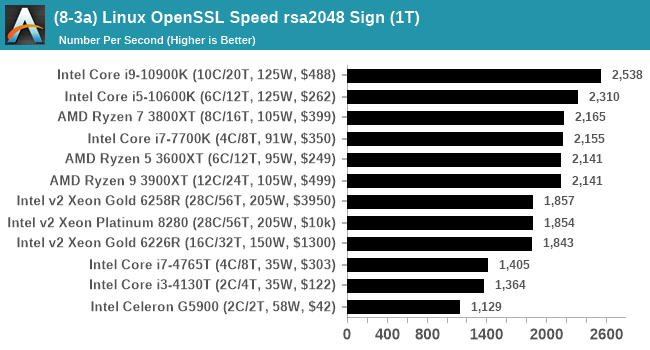
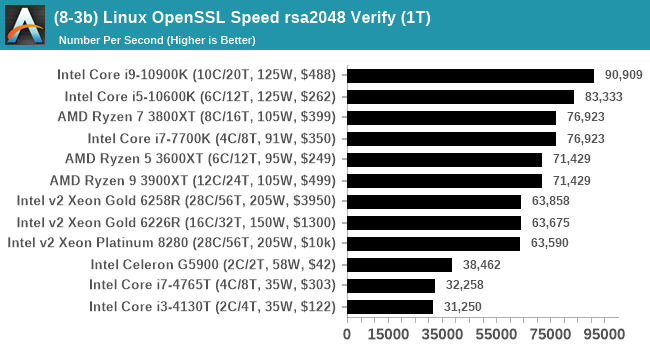
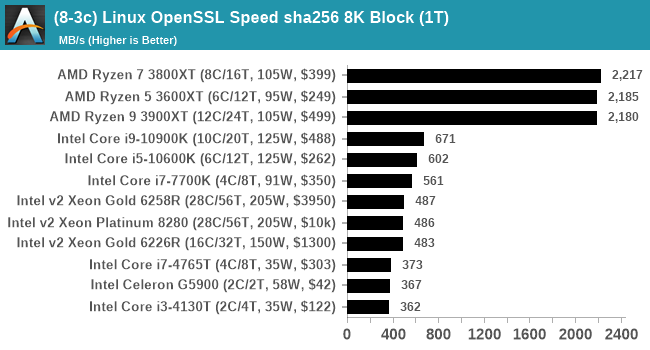
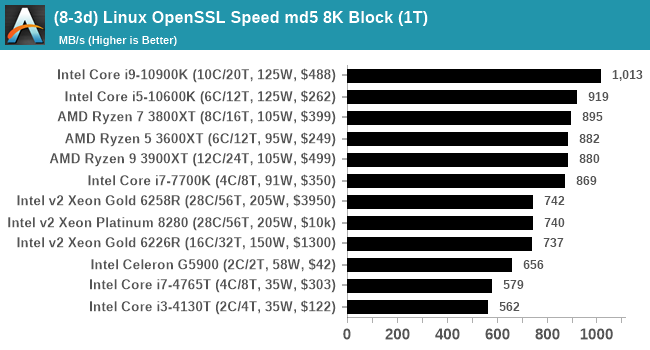
This test produces a lot of graphs, so for full reviews I might keep the rsa2048 ones and just leave the sha256/md5 data in Bench.
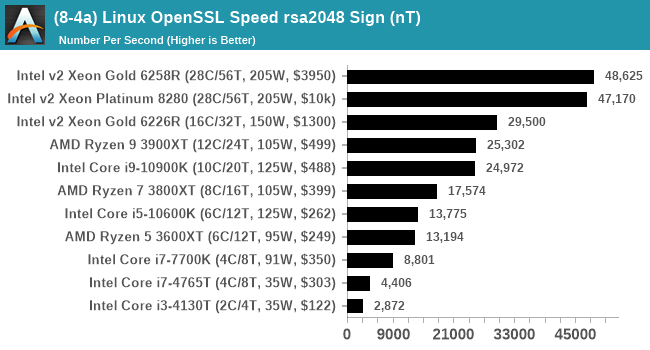
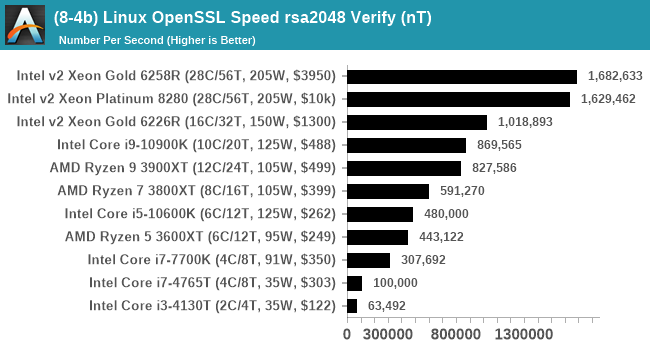
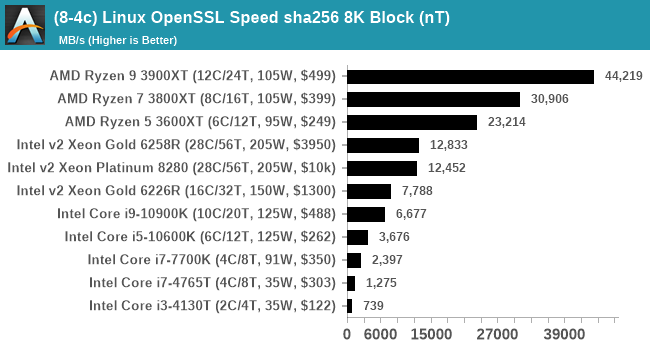
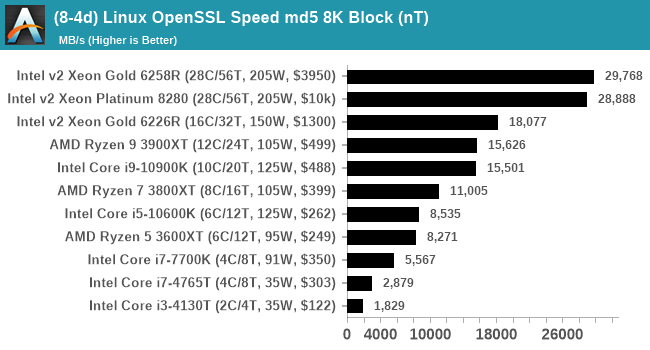
The AMD CPUs do really well in the sha256 test due to native support for SHA256 instructions.
GeekBench 4: Link
As a common tool for cross-platform testing between mobile, PC, and Mac, GeekBench is an ultimate exercise in synthetic testing across a range of algorithms looking for peak throughput. Tests include encryption, compression, fast Fourier transform, memory operations, n-body physics, matrix operations, histogram manipulation, and HTML parsing.
I’m including this test due to popular demand, although the results do come across as overly synthetic, and a lot of users often put a lot of weight behind the test due to the fact that it is compiled across different platforms (although with different compilers). Technically GeekBench 5 exists, however we do not have a key for the pro version that allows for command line processing.
For reviews we are posting the overall single and multi-threaded results.
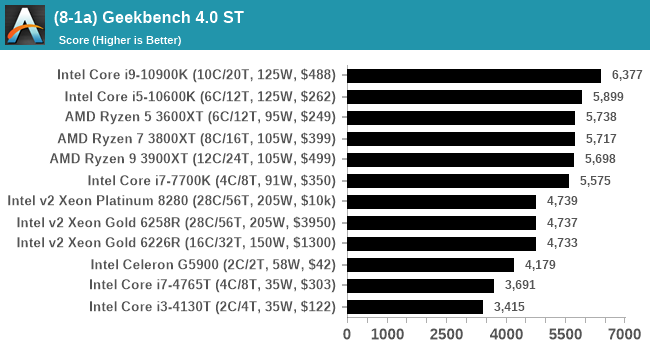
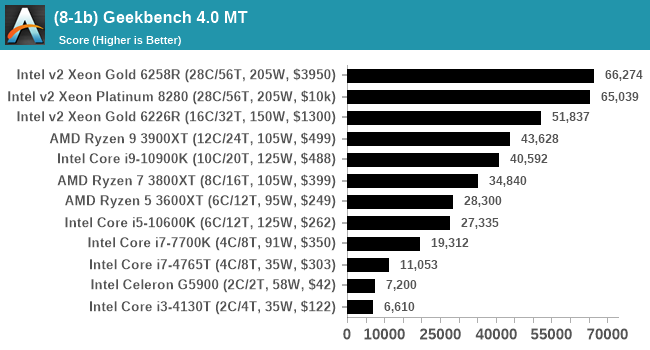
I have noticed that Geekbench 4 over Geekbench 5 does rely a lot on its memory subtests, which could play a factor if we have to test limited-access CPUs in different systems.
AIDA64 Memory Bandwidth: Link
Speaking of memory, one of the requests we have had is to showcase memory bandwidth. Lately AIDA64 has been doing some good work in providing automation access, so for this test I used the command line and some regex to extract the data from the JSON output. AIDA also provides screenshots of its testing windows as required.
For the most part, we expect CPUs of the same family with the same memory support to not differ that much – there will be minor differences based on the exact frequency of the time, or how the power budget gets moved around, or how many cores are being fed by the memory at one time.
LinX 0.9.5 LINPACK
One of the benchmarks I’ve been after for a while is just something that outputs a very simple GFLOPs FP64 number, or in the case of AI I’d like to get a value for TOPs at a given level of quantization (FP32/FP16/INT8 etc). The most popular tool for doing this on supercomputers is a form of LINPACK, however for consumer systems it’s a case of making sure that the software is optimized for each CPU.
LinX has been a popular interface for LINPACK on Windows for a number of years. However the last official version was 0.6.5, launched in 2015, before the latest Ryzen hardware came into being. HWTips in Korea has been updating LinX and has separated out into two versions, one for Intel and one for AMD, and both have reached version 0.9.5. Unfortunately the AMD version is still a work in progress, as it doesn’t work on Zen 2.
There does exist a program called Linpack Extreme 1.1.3, which claims to be updated to use the latest version of the Intel Math Kernel Libraries. It works great, however the way the interface has been designed means that it can’t be automated for our uses, so we can’t use it.
For LinX 0.9.5, there also is a difficulty of what parameters to put into LINPACK. The two main parameters are problem size and time – choose a problem size too small, and you won’t get peak performance. Choose it too large, and the calculation can go on for hours. To that end, we use the following algorithms as a compromise:
- Memory Use = Floor(1000 + 20*sqrt(threads)) MB
- Time = Floor(10+sqrt(threads)) minutes
For a 4 thread system, we use 1040 MB and run for 12 minutes.
For a 128 thread system, we use 1226 MB and run for 21 minutes.
We take the peak value of GFLOPs by the output as a result. Unfortunately the output doesn’t come out in a clean UTF-8 regular output, which means this is one result we have to read direct from the results file.
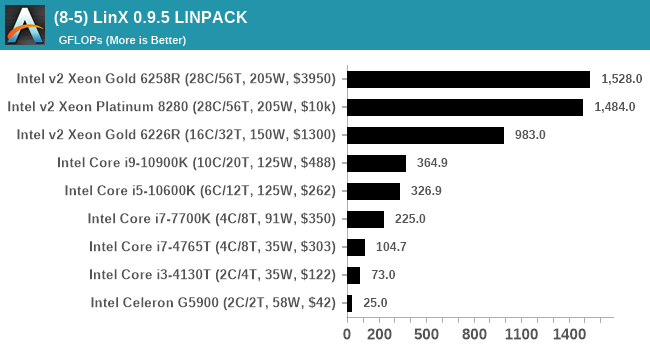
As we add in more CPUs, this graph should look more interesting. If a Zen2 version is deployed, we will adjust our script accordingly.


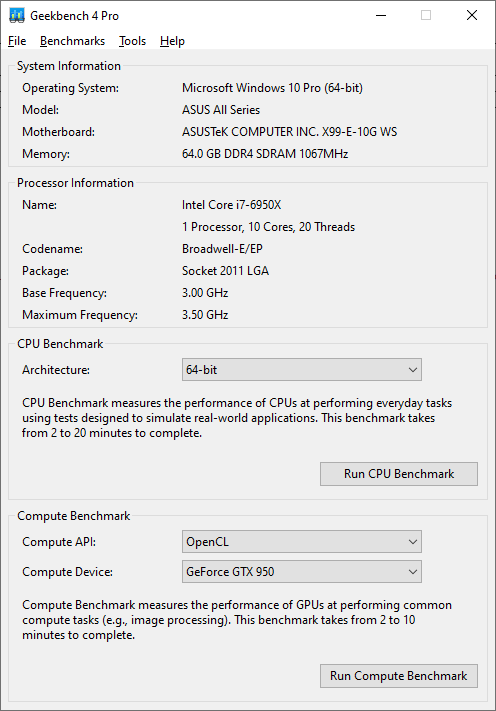

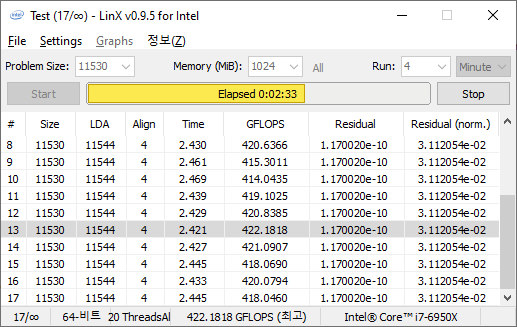








110 Comments
View All Comments
Sootie - Tuesday, July 21, 2020 - link
Any chance of a crowd sourced version of the bench? People with unusual CPU's could run a cut down version of the bench with only software that does not require a license and heavily disclaimed that it was not an official run just to add a few more data points of rare devices. I have a whole museum of old servers I can run some tests on but it's not practical to send them elsewhere.I'm a big fan of all the work you have done and are doing on the bench though I use it constantly for work and home.
Tilmitt - Tuesday, July 21, 2020 - link
Phenom II X6 and X4 would be cool to see if the "more cores make future proof" narrative actually holds up.lmcd - Tuesday, July 21, 2020 - link
X6 outperformed early Bulldozer 8 cores by a notable bit if that's of any interest.loads2compute - Tuesday, July 21, 2020 - link
Dear Ian,Wow! What a nice idea to test all these legacy processors on modern benchmarks. I think it is a great idea!
But als wow, what an enormous effort you are taking on automating all that stuff, starting from scratch and using autohotkey as your main tool. It seems like going to an uninhabited island, starting civilization from scratch and taking a tin opener as your main tool.
In my line of work (bioinformatics) we have to automate a load of consecutive tasks. Luckily there are frameworks for this, which make the work a lot easier.
Luckily there is already a framework for automated testing and benchmarking which happens to work on Linux, Mac and Windows (and even BSD). It is called the phoronix test suite http://phoronix-test-suite.com/. It can be extended with modules, so you could integrate all your desired tests in there. There is even paid support available, but since they guy who runs this (Michael Larabel) is working on a fellow tech outlet (phoronix.com) I am sure you can work something out to your mutual benefit. No doubt he is interested in all these old processor benchmarks too!
The phoronix test suite also comes with phoromatic, which according to the website : "allows the automatic scheduling of tests, remote installation of new tests, and the management of multiple test systems all through an intuitive, easy-to-use web interface."
So please do not start from scratch and do this yourself! Use this great open-source tool that is already available and consequently you will be able to get a lot more work done on the stuff that actually interests you! (I take it AHK scripting is not your hobby).
Ian Cutress - Tuesday, July 21, 2020 - link
Scripts are already done :)The issue is that a lot of tests have a lot of different entry points; with AHK I can customizer for each. I've been using it for 5 years now, so coding isn't an issue any more.
Fwiw, I speak with Michael on occasion. We go to the same industry events etc
eek2121 - Tuesday, July 21, 2020 - link
Was procuring a new GPU really that hard? I am going to blame your owner on this one. If you were an independent website I honestly would have purchased a 2080ti and donated it to you. It honestly seems like not being independent is hurting you more than it is helping. Without going into specifics, I know of websites smaller than AT that can afford at least 3 good full time writers and a bunch of awesome hardware.I have toyed with the idea of starting an alternative site where all hardware is procured in the retail channel. I know what advertising rates are like and I know that using affiliates, sponsorships, and advertising more than cover the cost of a few models per generation. Maybe it’s time AT staff strike out on their own. Just a thought.
Outside of that, I look forward to future endeavors.
Ian Cutress - Tuesday, July 21, 2020 - link
Procuring a GPU is always difficult, as we don't have the bandwidth to test AIB cards any more.Fwiw AT only has 2/3 FT writers.
If we were to spin back out, we'd need investors and a strategy.
Igor_Kavinski - Tuesday, July 21, 2020 - link
Request: Core i7-7700K DDR3 benchmarks (There are Asus and Gigabyte mobos that allow DDR3 to be used) to compare with Core i7-7700K DDR4 benchmarks. Thanks!Xex360 - Tuesday, July 21, 2020 - link
Very fascinating.dad_at - Tuesday, July 21, 2020 - link
Pls include HEDT Sandy Bridge E: one of Core i7 3960X, 3970X, 3930K, etc. Once it was present in the CPU bench, but you removed it since 2017...